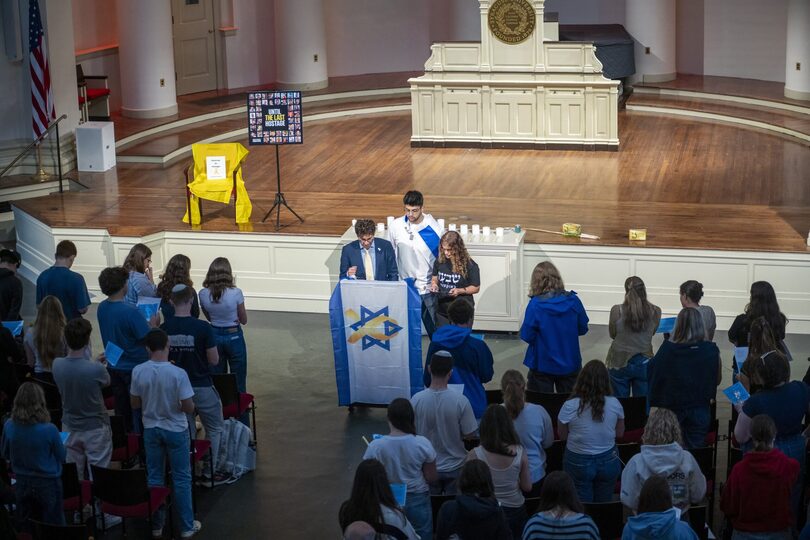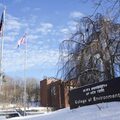SU community members commemorate hostages, victims 2 years after Oct. 7 attack

Attendees lit 48 candles at the front of Hendricks Chapel Tuesday night to honor Israeli hostages still in captivity and the 1,200 people killed in the Oct. 7 Hamas-led attack on Israel. Charlie Hynes | Staff Photographer
Get the latest Syracuse news delivered right to your inbox.
Subscribe to our newsletter here.
Forty-eight yellow candles were lit at the front of Syracuse University’s Hendricks Chapel Tuesday night to honor the hostages still in captivity during a commemoration for the 1,200 people killed in the Oct. 7 Hamas-led attack on Israel.
The service, led by Hendricks Chapel Jewish chaplain Rabbi Natan Levy, involved prayer, stories, singing and dancing. While praying for the hostages currently being held by Hamas, students shared anecdotes about time spent in Israel and their historical and cultural connections to the country.
Organized by SU Hillel, Israel Culture Club, Chabad SU and the Israeli American Council, Levy opened the vigil by imparting words of aspiration to the crowd. He said, despite all differences, today is for those held hostage by Hamas.
“Here we will sing with hope, here we will yearn and cry for the 48 hostages,” he said.
Tal Yechezkell, a senior studying film and media arts, said every generation has a day they say changes who they are. In his remarks, he said Oct. 7 was that day for him, when Jewish people observed “the worst massacre since the Holocaust.”
“More than 1,200 people were murdered in cold blood. Among them, children who will never get to grow up, sons and daughters who will never come home from school and husbands and wives who will never hold them again,” Yechezkell said.
Yechezkell spoke about the 48 hostages currently being held in Gaza, with only 20 believed to be alive. He said the rest never had the chance to say a final goodbye to their loved ones. He then led a prayer for the hostages, remaining hopeful for their arrival home.
“We will keep standing tall,” Yechezkell said. “We will not rest, we will not lie down, we will not stop until every hostage is brought home.”
Mikah Bein, founder and president of the Israel Culture Club at SU, said Israel is not just “a place on a map,” but a home for her.
She spoke about her upbringing in a first-generation American household, with parents from kibbutzim, communal villages in Israel, saying she carries the values from the community in her everyday life.
Bein’s parents carried Israel with them after moving to the United States, she said, and she still feels connected to the country through the values they instilled in her. She spoke about her cousin, who’s still living in Israel, and how much their lives differ.
Bein said the events of Oct. 7 “shattered” her feelings of safety, leaving holes that “may never be filled.” Despite this tragedy, the community will continue to rebuild and carry each other, she said.
Bein led and invited everyone at the service to sing Hatikvah, Israel’s national anthem.
Speaker Mia Gottesmann, a junior, shared stories about her time volunteering in Israel this past summer, describing how witnessing the country after Oct. 7 deeply impacted her. Despite any negative rhetoric spread on college campuses or social media, she said attendees “must move forward.”

Charlie Hynes | Staff Photographer
Organized by SU Hillel, Israel Culture Club, Chabad SU and the Israeli American Council and led by Hendricks Chapel Jewish chaplain Rabbi Natan Levy, the vigil involved prayer, stories, singing and dancing.
Gottesmann instructed the 12 students who were given a yellow candle to light them at the front for the 1,200 people killed two years ago.
Josh Rajunov, a junior studying broadcast digital journalism and Hillel’s Israel chair, ended the commemoration. He spoke about the Nova Music Festival, which was targeted by Hamas during Shemini Atzeret, a Jewish holiday.
“All of a sudden, those who were supposed to spend their day happy in celebration (went) running for their lives,” Rajunov said.
Rajunov continued, speaking to the strength Israel must show and the importance of working as a community to heal and support each other. He said it’s crucial to remember and keep saying the names of those held hostage, ensuring their safety back home.
“When we’re only sad, that means we have lost,” he said. “As the community rises, we move forward. I have hope.”
Zachary Braiterman, SU religion professor and acting director of the Jewish Studies Program, said he attended the commemoration because he was “deeply impacted” by Oct. 7 and wanted to support his students.
“Matters regarding Jewish history and Jewish life are a signature part of my own research and teaching here at the university,” Braiterman said. “I wanted to be here with the students and in support of students.”
Rajunov said Jewish students must continue to find their way on campus, suggesting that some students may have joined the commemoration because they felt lost. After the event, Rajunov said he hopes Jewish students felt safe and represented.
“Israel, to me, is more than a homeland. It’s family,” Bein said. “It’s the proof that from pain can come strength, that from loss can come unity, that even in darkness, we find light, sometimes faint, but always there.”





